Community Services Reflective Journal: Fieldwork Experience Analysis
VerifiedAdded on 2022/08/26
|11
|2922
|24
Journal and Reflective Writing
AI Summary
This reflective journal documents a student's fieldwork experience at the Southern Migrant and Refugee Centre (SMRC) as part of their Bachelor of Community Services program. The journal entries detail the application of classroom learning, such as empathy, honesty, and cooperation, in assisting clients seeking employment. The student reflects on challenges like cultural and language differences, the development of interpersonal skills, and the impact of their work on clients' lives. Specific tasks performed, including research on job vacancies and client counseling, are discussed, highlighting the benefits to clients. Interactions with supervisors, feedback received, and the student's communication and learning styles are also explored. The journal concludes with reflections on the role of a community services worker, emphasizing the importance of empathy, patience, and understanding in supporting disadvantaged individuals and the need for increased community awareness of available services. The student's reflections demonstrate a growing understanding of the complexities and rewards of community service work.
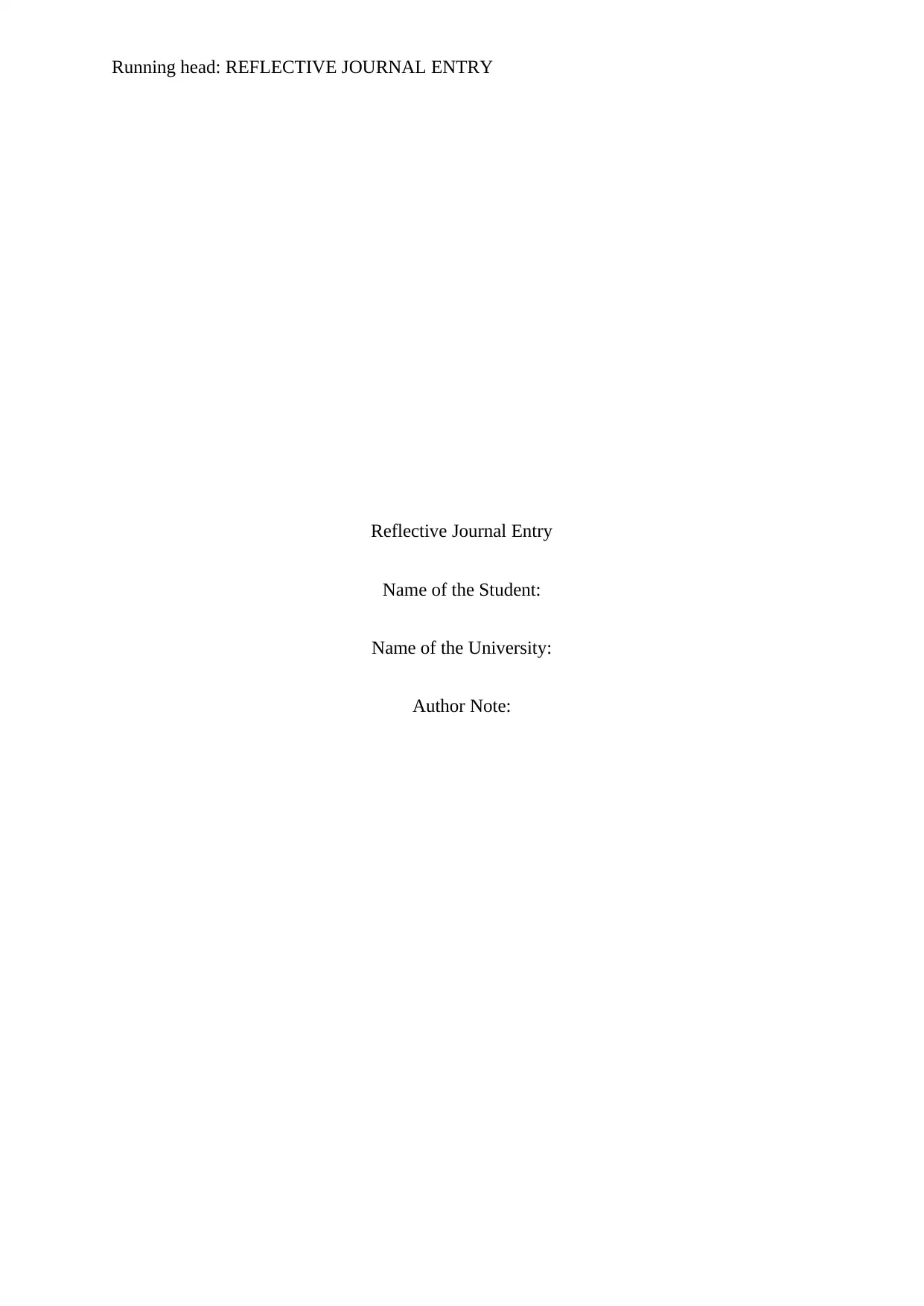
Running head: REFLECTIVE JOURNAL ENTRY
Reflective Journal Entry
Name of the Student:
Name of the University:
Author Note:
Reflective Journal Entry
Name of the Student:
Name of the University:
Author Note:
Paraphrase This Document
Need a fresh take? Get an instant paraphrase of this document with our AI Paraphraser
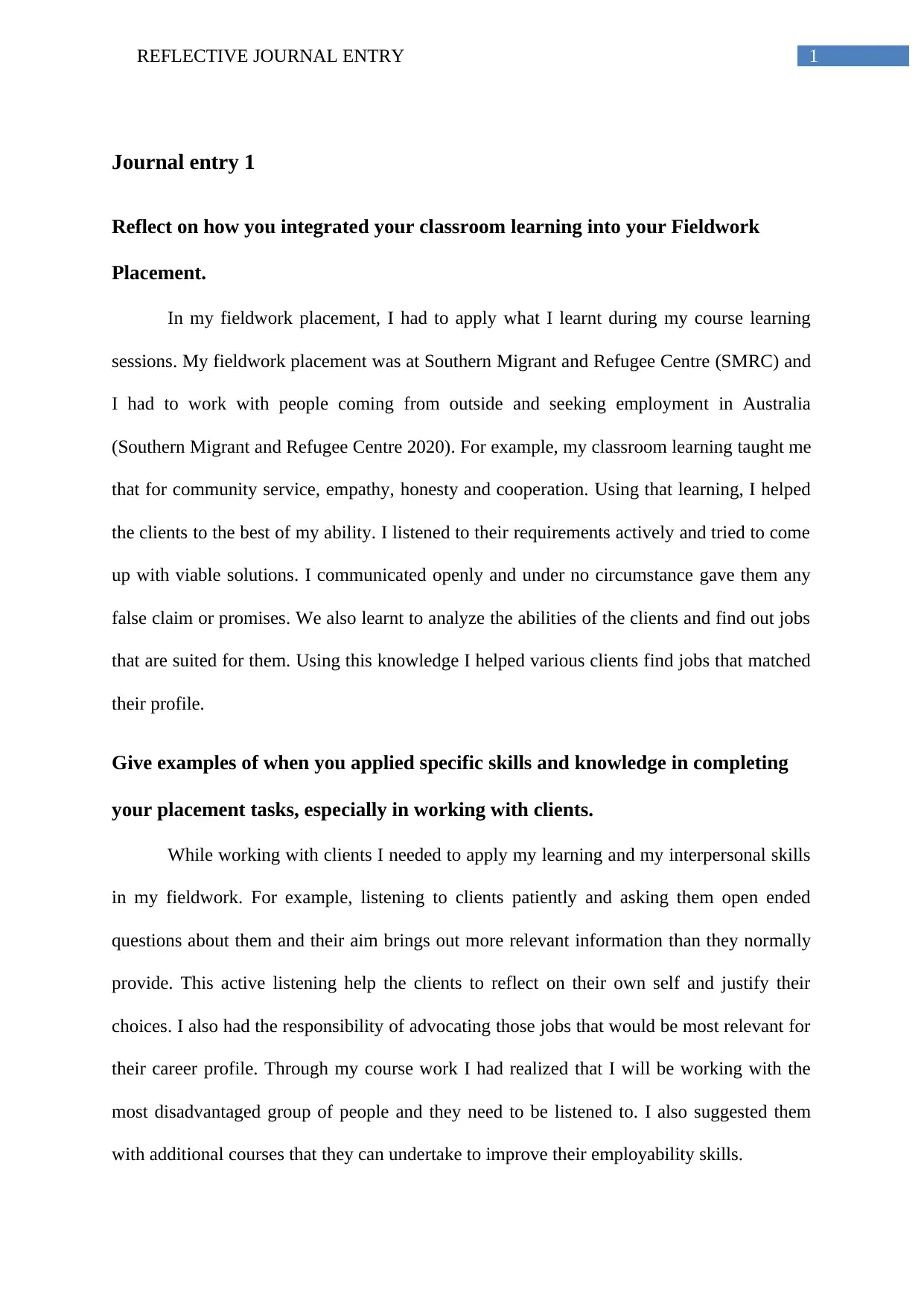
1REFLECTIVE JOURNAL ENTRY
Journal entry 1
Reflect on how you integrated your classroom learning into your Fieldwork
Placement.
In my fieldwork placement, I had to apply what I learnt during my course learning
sessions. My fieldwork placement was at Southern Migrant and Refugee Centre (SMRC) and
I had to work with people coming from outside and seeking employment in Australia
(Southern Migrant and Refugee Centre 2020). For example, my classroom learning taught me
that for community service, empathy, honesty and cooperation. Using that learning, I helped
the clients to the best of my ability. I listened to their requirements actively and tried to come
up with viable solutions. I communicated openly and under no circumstance gave them any
false claim or promises. We also learnt to analyze the abilities of the clients and find out jobs
that are suited for them. Using this knowledge I helped various clients find jobs that matched
their profile.
Give examples of when you applied specific skills and knowledge in completing
your placement tasks, especially in working with clients.
While working with clients I needed to apply my learning and my interpersonal skills
in my fieldwork. For example, listening to clients patiently and asking them open ended
questions about them and their aim brings out more relevant information than they normally
provide. This active listening help the clients to reflect on their own self and justify their
choices. I also had the responsibility of advocating those jobs that would be most relevant for
their career profile. Through my course work I had realized that I will be working with the
most disadvantaged group of people and they need to be listened to. I also suggested them
with additional courses that they can undertake to improve their employability skills.
Journal entry 1
Reflect on how you integrated your classroom learning into your Fieldwork
Placement.
In my fieldwork placement, I had to apply what I learnt during my course learning
sessions. My fieldwork placement was at Southern Migrant and Refugee Centre (SMRC) and
I had to work with people coming from outside and seeking employment in Australia
(Southern Migrant and Refugee Centre 2020). For example, my classroom learning taught me
that for community service, empathy, honesty and cooperation. Using that learning, I helped
the clients to the best of my ability. I listened to their requirements actively and tried to come
up with viable solutions. I communicated openly and under no circumstance gave them any
false claim or promises. We also learnt to analyze the abilities of the clients and find out jobs
that are suited for them. Using this knowledge I helped various clients find jobs that matched
their profile.
Give examples of when you applied specific skills and knowledge in completing
your placement tasks, especially in working with clients.
While working with clients I needed to apply my learning and my interpersonal skills
in my fieldwork. For example, listening to clients patiently and asking them open ended
questions about them and their aim brings out more relevant information than they normally
provide. This active listening help the clients to reflect on their own self and justify their
choices. I also had the responsibility of advocating those jobs that would be most relevant for
their career profile. Through my course work I had realized that I will be working with the
most disadvantaged group of people and they need to be listened to. I also suggested them
with additional courses that they can undertake to improve their employability skills.
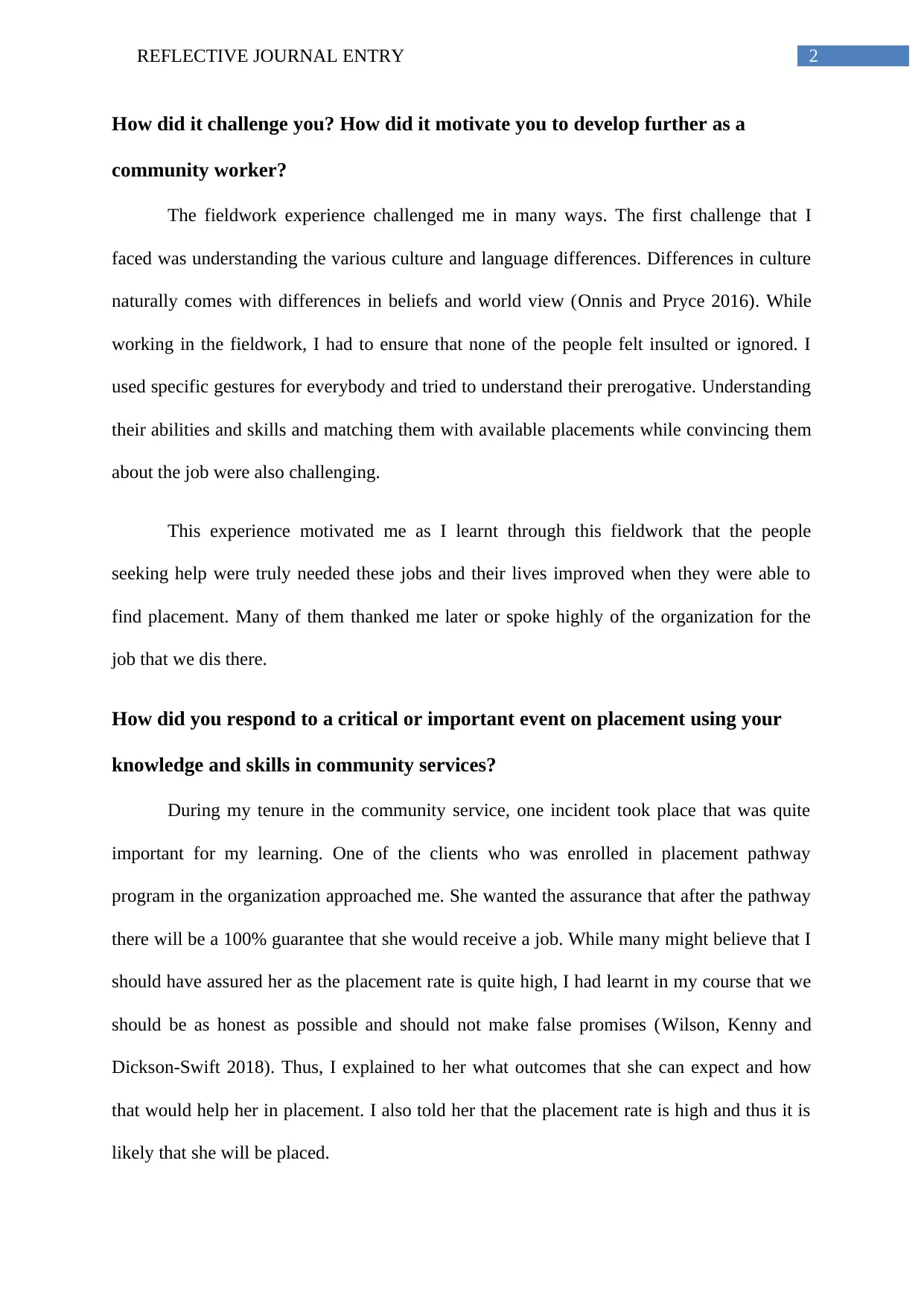
2REFLECTIVE JOURNAL ENTRY
How did it challenge you? How did it motivate you to develop further as a
community worker?
The fieldwork experience challenged me in many ways. The first challenge that I
faced was understanding the various culture and language differences. Differences in culture
naturally comes with differences in beliefs and world view (Onnis and Pryce 2016). While
working in the fieldwork, I had to ensure that none of the people felt insulted or ignored. I
used specific gestures for everybody and tried to understand their prerogative. Understanding
their abilities and skills and matching them with available placements while convincing them
about the job were also challenging.
This experience motivated me as I learnt through this fieldwork that the people
seeking help were truly needed these jobs and their lives improved when they were able to
find placement. Many of them thanked me later or spoke highly of the organization for the
job that we dis there.
How did you respond to a critical or important event on placement using your
knowledge and skills in community services?
During my tenure in the community service, one incident took place that was quite
important for my learning. One of the clients who was enrolled in placement pathway
program in the organization approached me. She wanted the assurance that after the pathway
there will be a 100% guarantee that she would receive a job. While many might believe that I
should have assured her as the placement rate is quite high, I had learnt in my course that we
should be as honest as possible and should not make false promises (Wilson, Kenny and
Dickson-Swift 2018). Thus, I explained to her what outcomes that she can expect and how
that would help her in placement. I also told her that the placement rate is high and thus it is
likely that she will be placed.
How did it challenge you? How did it motivate you to develop further as a
community worker?
The fieldwork experience challenged me in many ways. The first challenge that I
faced was understanding the various culture and language differences. Differences in culture
naturally comes with differences in beliefs and world view (Onnis and Pryce 2016). While
working in the fieldwork, I had to ensure that none of the people felt insulted or ignored. I
used specific gestures for everybody and tried to understand their prerogative. Understanding
their abilities and skills and matching them with available placements while convincing them
about the job were also challenging.
This experience motivated me as I learnt through this fieldwork that the people
seeking help were truly needed these jobs and their lives improved when they were able to
find placement. Many of them thanked me later or spoke highly of the organization for the
job that we dis there.
How did you respond to a critical or important event on placement using your
knowledge and skills in community services?
During my tenure in the community service, one incident took place that was quite
important for my learning. One of the clients who was enrolled in placement pathway
program in the organization approached me. She wanted the assurance that after the pathway
there will be a 100% guarantee that she would receive a job. While many might believe that I
should have assured her as the placement rate is quite high, I had learnt in my course that we
should be as honest as possible and should not make false promises (Wilson, Kenny and
Dickson-Swift 2018). Thus, I explained to her what outcomes that she can expect and how
that would help her in placement. I also told her that the placement rate is high and thus it is
likely that she will be placed.
⊘ This is a preview!⊘
Do you want full access?
Subscribe today to unlock all pages.

Trusted by 1+ million students worldwide
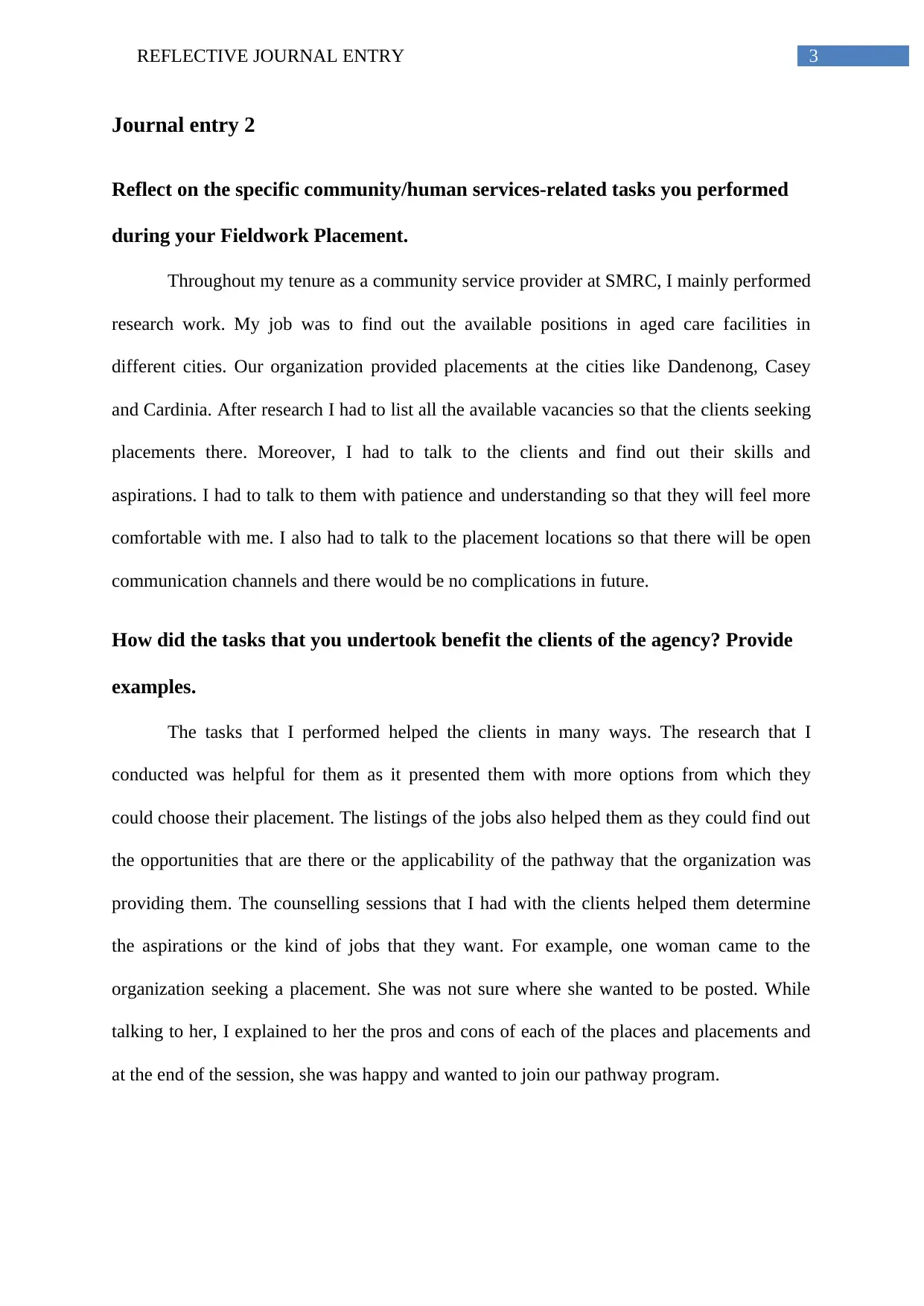
3REFLECTIVE JOURNAL ENTRY
Journal entry 2
Reflect on the specific community/human services-related tasks you performed
during your Fieldwork Placement.
Throughout my tenure as a community service provider at SMRC, I mainly performed
research work. My job was to find out the available positions in aged care facilities in
different cities. Our organization provided placements at the cities like Dandenong, Casey
and Cardinia. After research I had to list all the available vacancies so that the clients seeking
placements there. Moreover, I had to talk to the clients and find out their skills and
aspirations. I had to talk to them with patience and understanding so that they will feel more
comfortable with me. I also had to talk to the placement locations so that there will be open
communication channels and there would be no complications in future.
How did the tasks that you undertook benefit the clients of the agency? Provide
examples.
The tasks that I performed helped the clients in many ways. The research that I
conducted was helpful for them as it presented them with more options from which they
could choose their placement. The listings of the jobs also helped them as they could find out
the opportunities that are there or the applicability of the pathway that the organization was
providing them. The counselling sessions that I had with the clients helped them determine
the aspirations or the kind of jobs that they want. For example, one woman came to the
organization seeking a placement. She was not sure where she wanted to be posted. While
talking to her, I explained to her the pros and cons of each of the places and placements and
at the end of the session, she was happy and wanted to join our pathway program.
Journal entry 2
Reflect on the specific community/human services-related tasks you performed
during your Fieldwork Placement.
Throughout my tenure as a community service provider at SMRC, I mainly performed
research work. My job was to find out the available positions in aged care facilities in
different cities. Our organization provided placements at the cities like Dandenong, Casey
and Cardinia. After research I had to list all the available vacancies so that the clients seeking
placements there. Moreover, I had to talk to the clients and find out their skills and
aspirations. I had to talk to them with patience and understanding so that they will feel more
comfortable with me. I also had to talk to the placement locations so that there will be open
communication channels and there would be no complications in future.
How did the tasks that you undertook benefit the clients of the agency? Provide
examples.
The tasks that I performed helped the clients in many ways. The research that I
conducted was helpful for them as it presented them with more options from which they
could choose their placement. The listings of the jobs also helped them as they could find out
the opportunities that are there or the applicability of the pathway that the organization was
providing them. The counselling sessions that I had with the clients helped them determine
the aspirations or the kind of jobs that they want. For example, one woman came to the
organization seeking a placement. She was not sure where she wanted to be posted. While
talking to her, I explained to her the pros and cons of each of the places and placements and
at the end of the session, she was happy and wanted to join our pathway program.
Paraphrase This Document
Need a fresh take? Get an instant paraphrase of this document with our AI Paraphraser
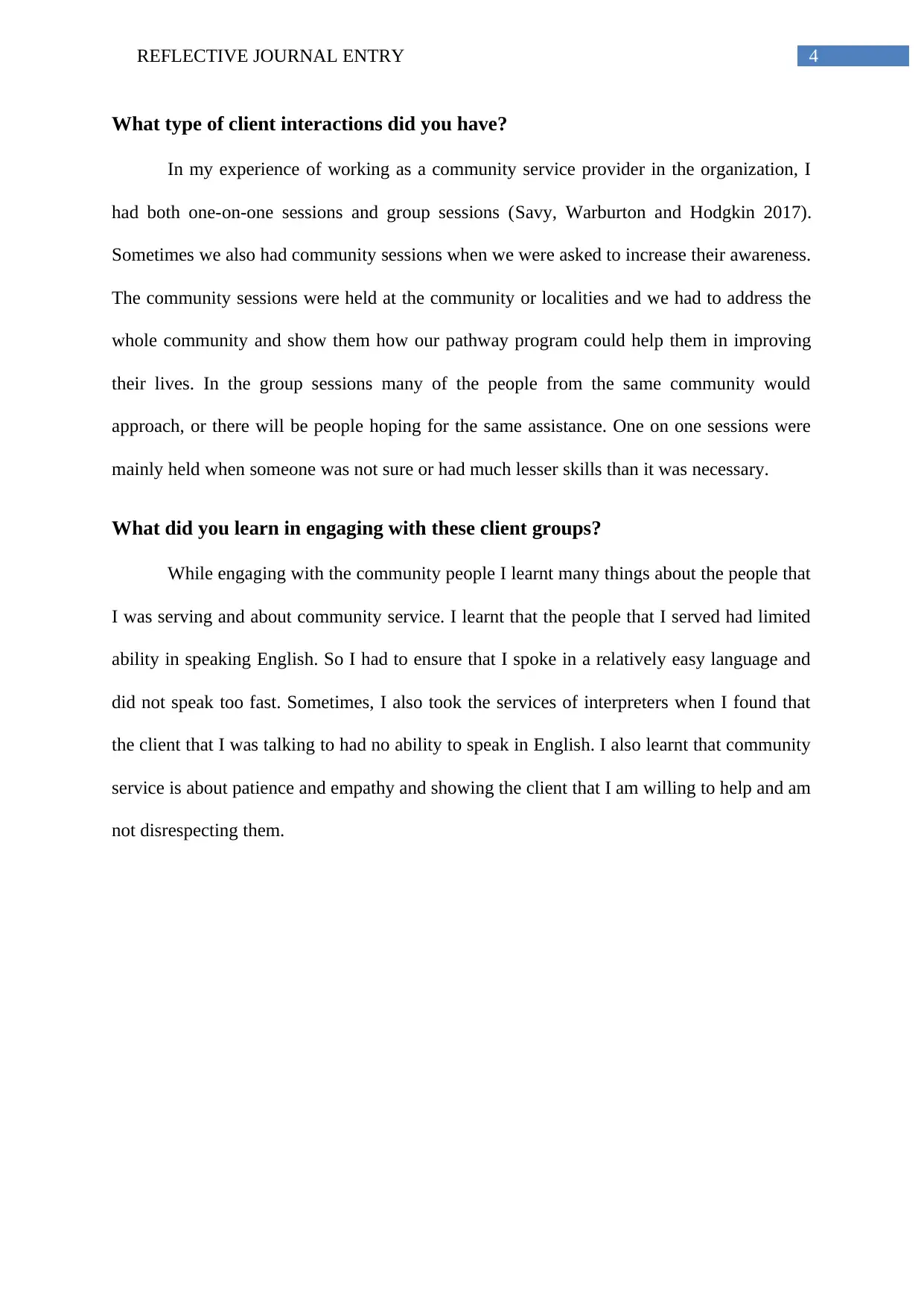
4REFLECTIVE JOURNAL ENTRY
What type of client interactions did you have?
In my experience of working as a community service provider in the organization, I
had both one-on-one sessions and group sessions (Savy, Warburton and Hodgkin 2017).
Sometimes we also had community sessions when we were asked to increase their awareness.
The community sessions were held at the community or localities and we had to address the
whole community and show them how our pathway program could help them in improving
their lives. In the group sessions many of the people from the same community would
approach, or there will be people hoping for the same assistance. One on one sessions were
mainly held when someone was not sure or had much lesser skills than it was necessary.
What did you learn in engaging with these client groups?
While engaging with the community people I learnt many things about the people that
I was serving and about community service. I learnt that the people that I served had limited
ability in speaking English. So I had to ensure that I spoke in a relatively easy language and
did not speak too fast. Sometimes, I also took the services of interpreters when I found that
the client that I was talking to had no ability to speak in English. I also learnt that community
service is about patience and empathy and showing the client that I am willing to help and am
not disrespecting them.
What type of client interactions did you have?
In my experience of working as a community service provider in the organization, I
had both one-on-one sessions and group sessions (Savy, Warburton and Hodgkin 2017).
Sometimes we also had community sessions when we were asked to increase their awareness.
The community sessions were held at the community or localities and we had to address the
whole community and show them how our pathway program could help them in improving
their lives. In the group sessions many of the people from the same community would
approach, or there will be people hoping for the same assistance. One on one sessions were
mainly held when someone was not sure or had much lesser skills than it was necessary.
What did you learn in engaging with these client groups?
While engaging with the community people I learnt many things about the people that
I was serving and about community service. I learnt that the people that I served had limited
ability in speaking English. So I had to ensure that I spoke in a relatively easy language and
did not speak too fast. Sometimes, I also took the services of interpreters when I found that
the client that I was talking to had no ability to speak in English. I also learnt that community
service is about patience and empathy and showing the client that I am willing to help and am
not disrespecting them.
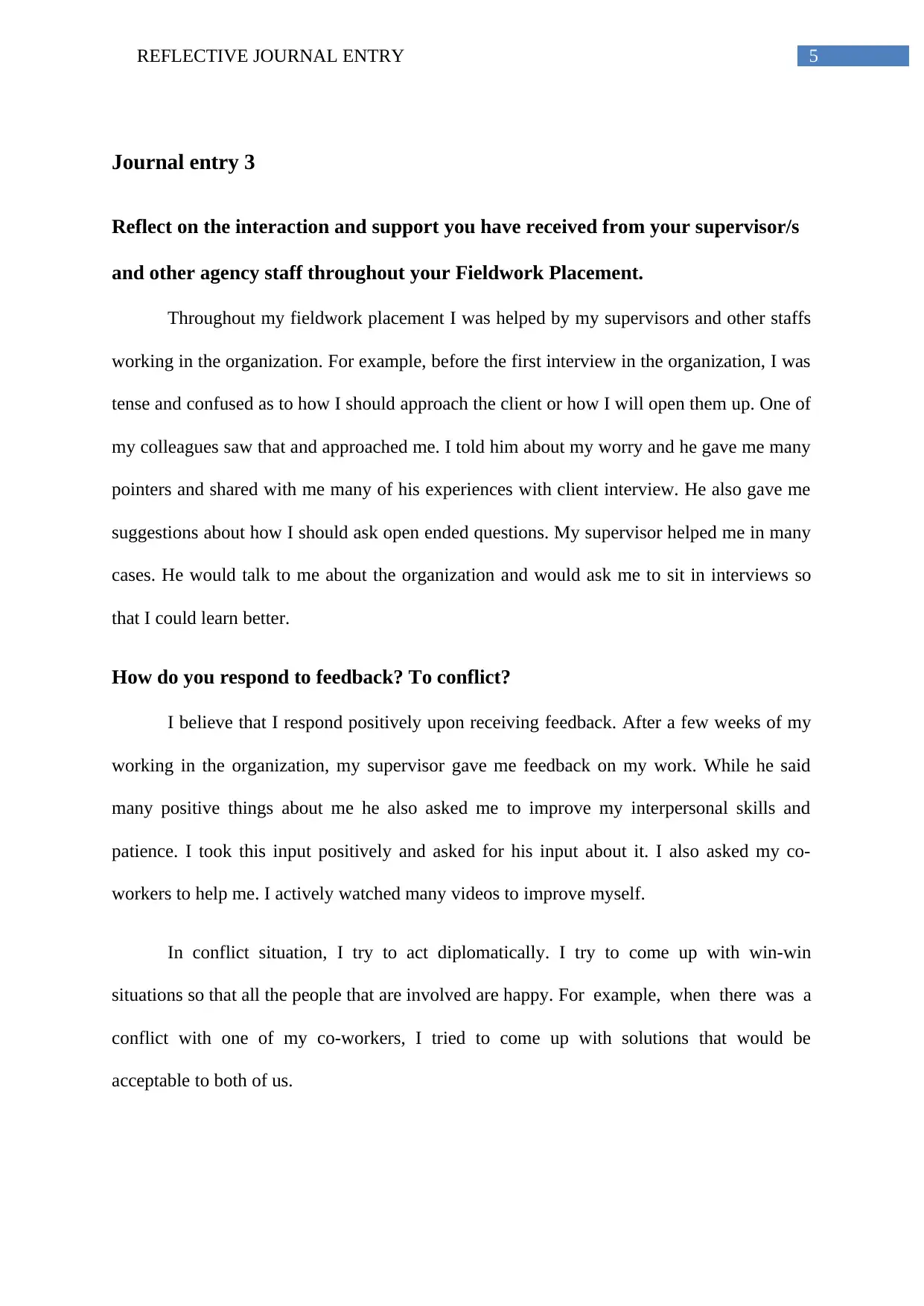
5REFLECTIVE JOURNAL ENTRY
Journal entry 3
Reflect on the interaction and support you have received from your supervisor/s
and other agency staff throughout your Fieldwork Placement.
Throughout my fieldwork placement I was helped by my supervisors and other staffs
working in the organization. For example, before the first interview in the organization, I was
tense and confused as to how I should approach the client or how I will open them up. One of
my colleagues saw that and approached me. I told him about my worry and he gave me many
pointers and shared with me many of his experiences with client interview. He also gave me
suggestions about how I should ask open ended questions. My supervisor helped me in many
cases. He would talk to me about the organization and would ask me to sit in interviews so
that I could learn better.
How do you respond to feedback? To conflict?
I believe that I respond positively upon receiving feedback. After a few weeks of my
working in the organization, my supervisor gave me feedback on my work. While he said
many positive things about me he also asked me to improve my interpersonal skills and
patience. I took this input positively and asked for his input about it. I also asked my co-
workers to help me. I actively watched many videos to improve myself.
In conflict situation, I try to act diplomatically. I try to come up with win-win
situations so that all the people that are involved are happy. For example, when there was a
conflict with one of my co-workers, I tried to come up with solutions that would be
acceptable to both of us.
Journal entry 3
Reflect on the interaction and support you have received from your supervisor/s
and other agency staff throughout your Fieldwork Placement.
Throughout my fieldwork placement I was helped by my supervisors and other staffs
working in the organization. For example, before the first interview in the organization, I was
tense and confused as to how I should approach the client or how I will open them up. One of
my colleagues saw that and approached me. I told him about my worry and he gave me many
pointers and shared with me many of his experiences with client interview. He also gave me
suggestions about how I should ask open ended questions. My supervisor helped me in many
cases. He would talk to me about the organization and would ask me to sit in interviews so
that I could learn better.
How do you respond to feedback? To conflict?
I believe that I respond positively upon receiving feedback. After a few weeks of my
working in the organization, my supervisor gave me feedback on my work. While he said
many positive things about me he also asked me to improve my interpersonal skills and
patience. I took this input positively and asked for his input about it. I also asked my co-
workers to help me. I actively watched many videos to improve myself.
In conflict situation, I try to act diplomatically. I try to come up with win-win
situations so that all the people that are involved are happy. For example, when there was a
conflict with one of my co-workers, I tried to come up with solutions that would be
acceptable to both of us.
⊘ This is a preview!⊘
Do you want full access?
Subscribe today to unlock all pages.

Trusted by 1+ million students worldwide
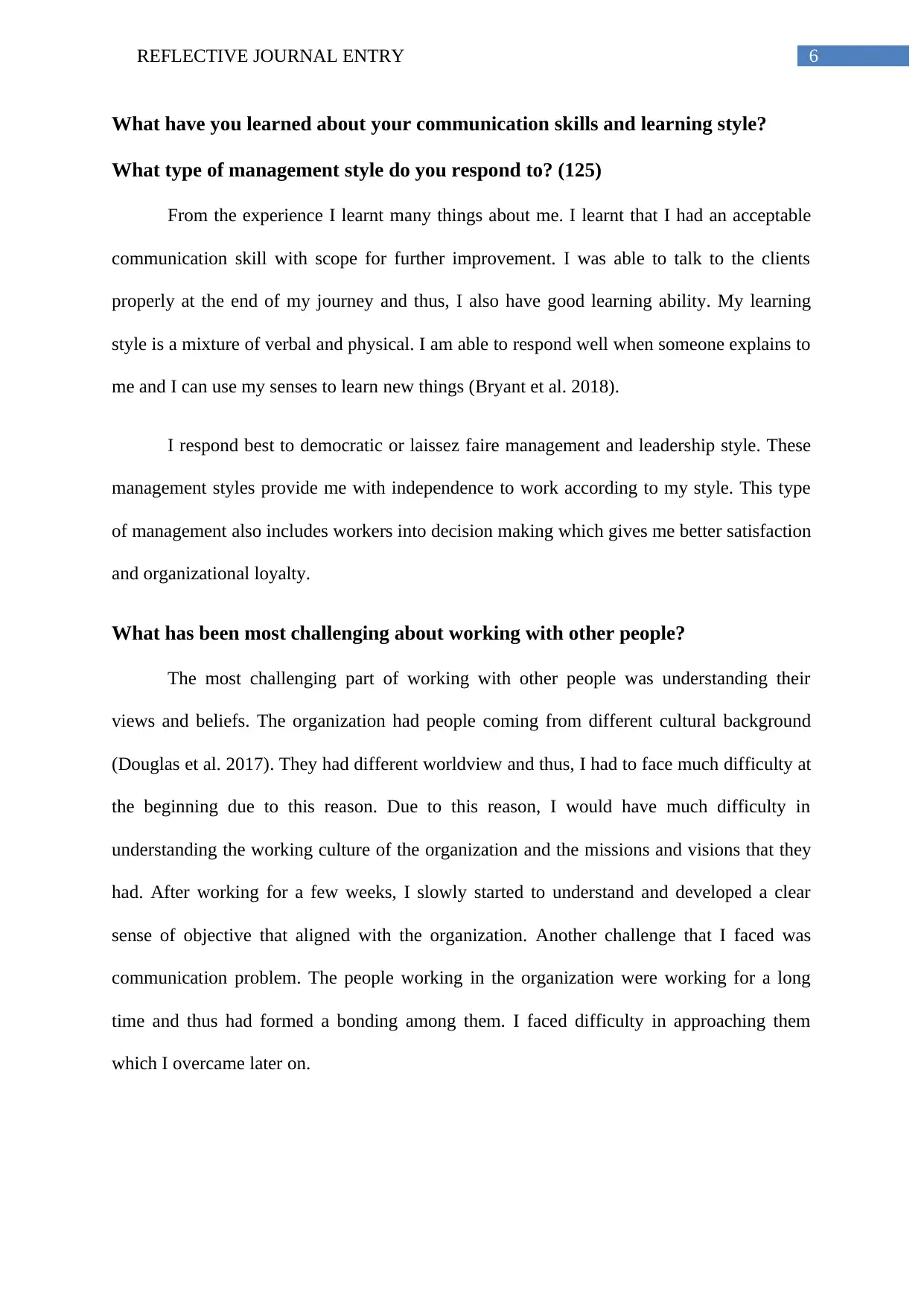
6REFLECTIVE JOURNAL ENTRY
What have you learned about your communication skills and learning style?
What type of management style do you respond to? (125)
From the experience I learnt many things about me. I learnt that I had an acceptable
communication skill with scope for further improvement. I was able to talk to the clients
properly at the end of my journey and thus, I also have good learning ability. My learning
style is a mixture of verbal and physical. I am able to respond well when someone explains to
me and I can use my senses to learn new things (Bryant et al. 2018).
I respond best to democratic or laissez faire management and leadership style. These
management styles provide me with independence to work according to my style. This type
of management also includes workers into decision making which gives me better satisfaction
and organizational loyalty.
What has been most challenging about working with other people?
The most challenging part of working with other people was understanding their
views and beliefs. The organization had people coming from different cultural background
(Douglas et al. 2017). They had different worldview and thus, I had to face much difficulty at
the beginning due to this reason. Due to this reason, I would have much difficulty in
understanding the working culture of the organization and the missions and visions that they
had. After working for a few weeks, I slowly started to understand and developed a clear
sense of objective that aligned with the organization. Another challenge that I faced was
communication problem. The people working in the organization were working for a long
time and thus had formed a bonding among them. I faced difficulty in approaching them
which I overcame later on.
What have you learned about your communication skills and learning style?
What type of management style do you respond to? (125)
From the experience I learnt many things about me. I learnt that I had an acceptable
communication skill with scope for further improvement. I was able to talk to the clients
properly at the end of my journey and thus, I also have good learning ability. My learning
style is a mixture of verbal and physical. I am able to respond well when someone explains to
me and I can use my senses to learn new things (Bryant et al. 2018).
I respond best to democratic or laissez faire management and leadership style. These
management styles provide me with independence to work according to my style. This type
of management also includes workers into decision making which gives me better satisfaction
and organizational loyalty.
What has been most challenging about working with other people?
The most challenging part of working with other people was understanding their
views and beliefs. The organization had people coming from different cultural background
(Douglas et al. 2017). They had different worldview and thus, I had to face much difficulty at
the beginning due to this reason. Due to this reason, I would have much difficulty in
understanding the working culture of the organization and the missions and visions that they
had. After working for a few weeks, I slowly started to understand and developed a clear
sense of objective that aligned with the organization. Another challenge that I faced was
communication problem. The people working in the organization were working for a long
time and thus had formed a bonding among them. I faced difficulty in approaching them
which I overcame later on.
Paraphrase This Document
Need a fresh take? Get an instant paraphrase of this document with our AI Paraphraser
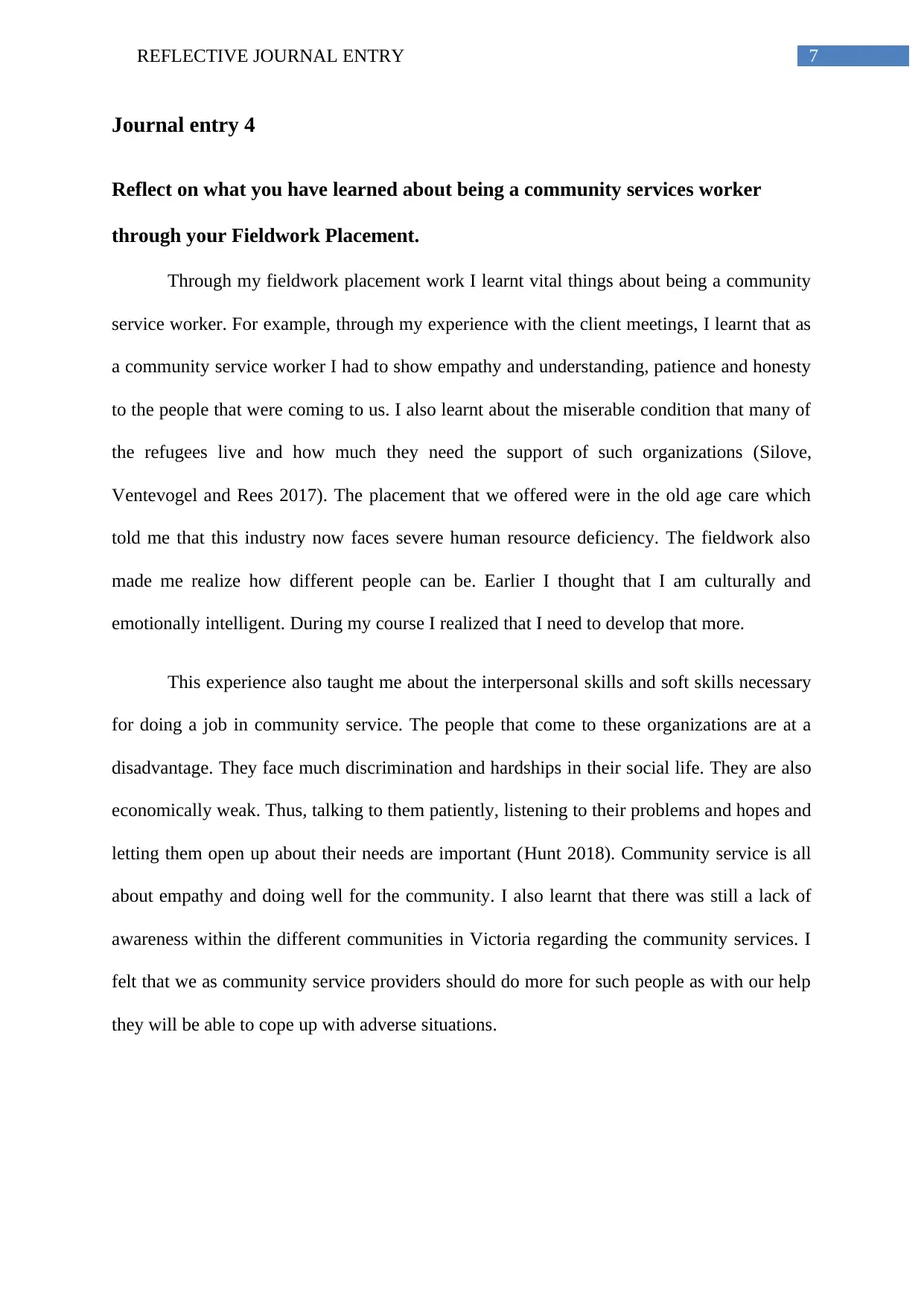
7REFLECTIVE JOURNAL ENTRY
Journal entry 4
Reflect on what you have learned about being a community services worker
through your Fieldwork Placement.
Through my fieldwork placement work I learnt vital things about being a community
service worker. For example, through my experience with the client meetings, I learnt that as
a community service worker I had to show empathy and understanding, patience and honesty
to the people that were coming to us. I also learnt about the miserable condition that many of
the refugees live and how much they need the support of such organizations (Silove,
Ventevogel and Rees 2017). The placement that we offered were in the old age care which
told me that this industry now faces severe human resource deficiency. The fieldwork also
made me realize how different people can be. Earlier I thought that I am culturally and
emotionally intelligent. During my course I realized that I need to develop that more.
This experience also taught me about the interpersonal skills and soft skills necessary
for doing a job in community service. The people that come to these organizations are at a
disadvantage. They face much discrimination and hardships in their social life. They are also
economically weak. Thus, talking to them patiently, listening to their problems and hopes and
letting them open up about their needs are important (Hunt 2018). Community service is all
about empathy and doing well for the community. I also learnt that there was still a lack of
awareness within the different communities in Victoria regarding the community services. I
felt that we as community service providers should do more for such people as with our help
they will be able to cope up with adverse situations.
Journal entry 4
Reflect on what you have learned about being a community services worker
through your Fieldwork Placement.
Through my fieldwork placement work I learnt vital things about being a community
service worker. For example, through my experience with the client meetings, I learnt that as
a community service worker I had to show empathy and understanding, patience and honesty
to the people that were coming to us. I also learnt about the miserable condition that many of
the refugees live and how much they need the support of such organizations (Silove,
Ventevogel and Rees 2017). The placement that we offered were in the old age care which
told me that this industry now faces severe human resource deficiency. The fieldwork also
made me realize how different people can be. Earlier I thought that I am culturally and
emotionally intelligent. During my course I realized that I need to develop that more.
This experience also taught me about the interpersonal skills and soft skills necessary
for doing a job in community service. The people that come to these organizations are at a
disadvantage. They face much discrimination and hardships in their social life. They are also
economically weak. Thus, talking to them patiently, listening to their problems and hopes and
letting them open up about their needs are important (Hunt 2018). Community service is all
about empathy and doing well for the community. I also learnt that there was still a lack of
awareness within the different communities in Victoria regarding the community services. I
felt that we as community service providers should do more for such people as with our help
they will be able to cope up with adverse situations.
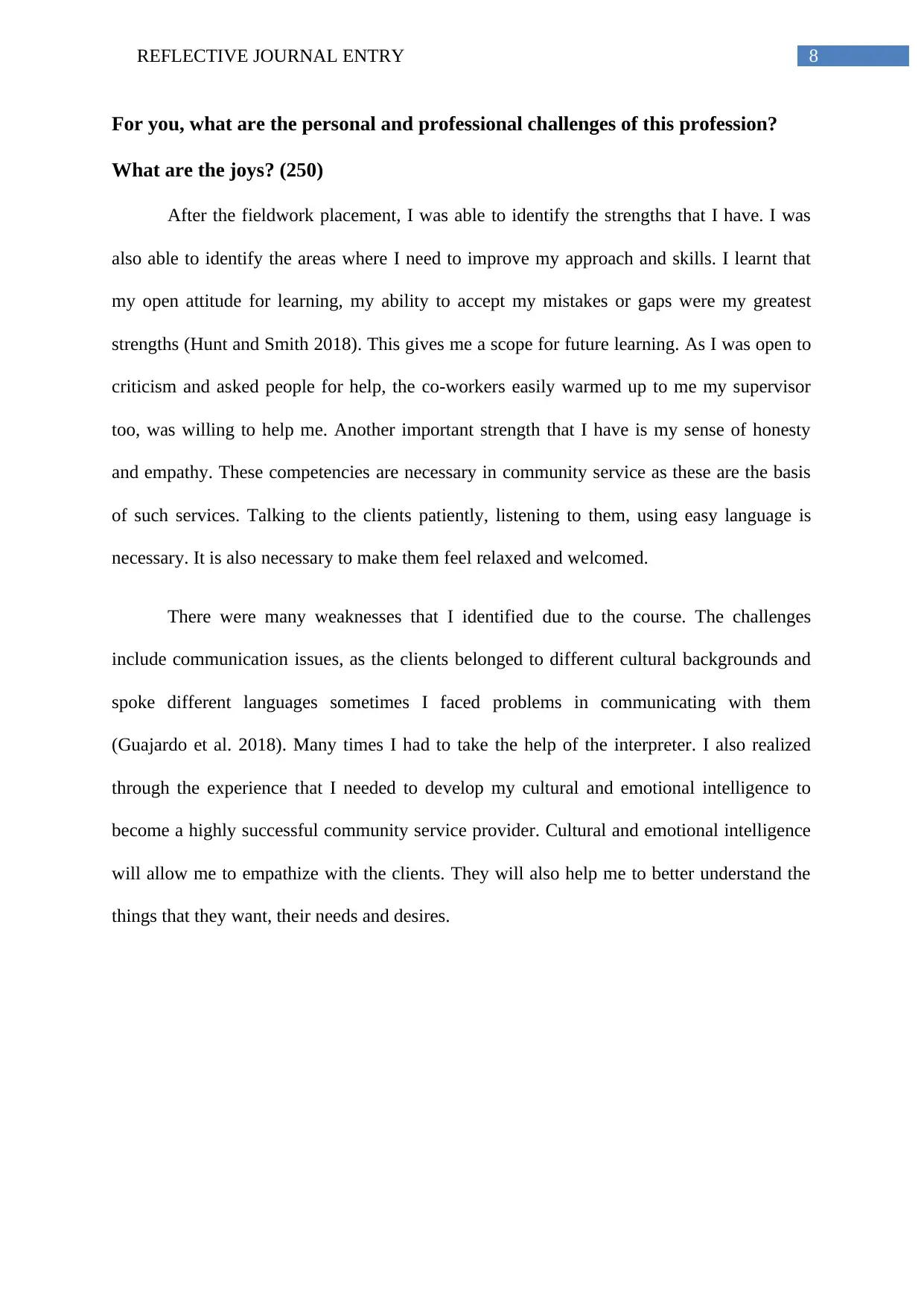
8REFLECTIVE JOURNAL ENTRY
For you, what are the personal and professional challenges of this profession?
What are the joys? (250)
After the fieldwork placement, I was able to identify the strengths that I have. I was
also able to identify the areas where I need to improve my approach and skills. I learnt that
my open attitude for learning, my ability to accept my mistakes or gaps were my greatest
strengths (Hunt and Smith 2018). This gives me a scope for future learning. As I was open to
criticism and asked people for help, the co-workers easily warmed up to me my supervisor
too, was willing to help me. Another important strength that I have is my sense of honesty
and empathy. These competencies are necessary in community service as these are the basis
of such services. Talking to the clients patiently, listening to them, using easy language is
necessary. It is also necessary to make them feel relaxed and welcomed.
There were many weaknesses that I identified due to the course. The challenges
include communication issues, as the clients belonged to different cultural backgrounds and
spoke different languages sometimes I faced problems in communicating with them
(Guajardo et al. 2018). Many times I had to take the help of the interpreter. I also realized
through the experience that I needed to develop my cultural and emotional intelligence to
become a highly successful community service provider. Cultural and emotional intelligence
will allow me to empathize with the clients. They will also help me to better understand the
things that they want, their needs and desires.
For you, what are the personal and professional challenges of this profession?
What are the joys? (250)
After the fieldwork placement, I was able to identify the strengths that I have. I was
also able to identify the areas where I need to improve my approach and skills. I learnt that
my open attitude for learning, my ability to accept my mistakes or gaps were my greatest
strengths (Hunt and Smith 2018). This gives me a scope for future learning. As I was open to
criticism and asked people for help, the co-workers easily warmed up to me my supervisor
too, was willing to help me. Another important strength that I have is my sense of honesty
and empathy. These competencies are necessary in community service as these are the basis
of such services. Talking to the clients patiently, listening to them, using easy language is
necessary. It is also necessary to make them feel relaxed and welcomed.
There were many weaknesses that I identified due to the course. The challenges
include communication issues, as the clients belonged to different cultural backgrounds and
spoke different languages sometimes I faced problems in communicating with them
(Guajardo et al. 2018). Many times I had to take the help of the interpreter. I also realized
through the experience that I needed to develop my cultural and emotional intelligence to
become a highly successful community service provider. Cultural and emotional intelligence
will allow me to empathize with the clients. They will also help me to better understand the
things that they want, their needs and desires.
⊘ This is a preview!⊘
Do you want full access?
Subscribe today to unlock all pages.

Trusted by 1+ million students worldwide
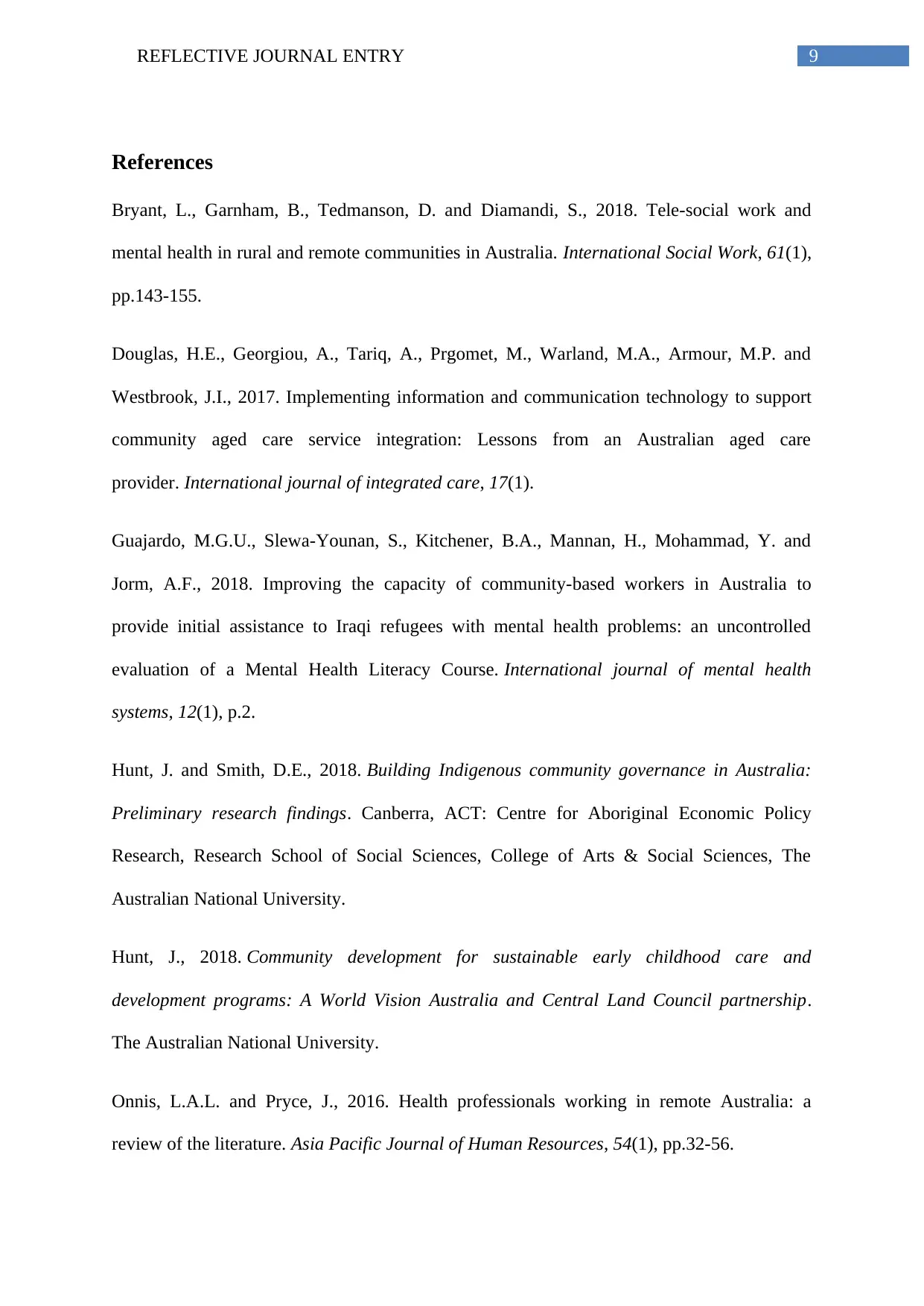
9REFLECTIVE JOURNAL ENTRY
References
Bryant, L., Garnham, B., Tedmanson, D. and Diamandi, S., 2018. Tele-social work and
mental health in rural and remote communities in Australia. International Social Work, 61(1),
pp.143-155.
Douglas, H.E., Georgiou, A., Tariq, A., Prgomet, M., Warland, M.A., Armour, M.P. and
Westbrook, J.I., 2017. Implementing information and communication technology to support
community aged care service integration: Lessons from an Australian aged care
provider. International journal of integrated care, 17(1).
Guajardo, M.G.U., Slewa-Younan, S., Kitchener, B.A., Mannan, H., Mohammad, Y. and
Jorm, A.F., 2018. Improving the capacity of community-based workers in Australia to
provide initial assistance to Iraqi refugees with mental health problems: an uncontrolled
evaluation of a Mental Health Literacy Course. International journal of mental health
systems, 12(1), p.2.
Hunt, J. and Smith, D.E., 2018. Building Indigenous community governance in Australia:
Preliminary research findings. Canberra, ACT: Centre for Aboriginal Economic Policy
Research, Research School of Social Sciences, College of Arts & Social Sciences, The
Australian National University.
Hunt, J., 2018. Community development for sustainable early childhood care and
development programs: A World Vision Australia and Central Land Council partnership.
The Australian National University.
Onnis, L.A.L. and Pryce, J., 2016. Health professionals working in remote Australia: a
review of the literature. Asia Pacific Journal of Human Resources, 54(1), pp.32-56.
References
Bryant, L., Garnham, B., Tedmanson, D. and Diamandi, S., 2018. Tele-social work and
mental health in rural and remote communities in Australia. International Social Work, 61(1),
pp.143-155.
Douglas, H.E., Georgiou, A., Tariq, A., Prgomet, M., Warland, M.A., Armour, M.P. and
Westbrook, J.I., 2017. Implementing information and communication technology to support
community aged care service integration: Lessons from an Australian aged care
provider. International journal of integrated care, 17(1).
Guajardo, M.G.U., Slewa-Younan, S., Kitchener, B.A., Mannan, H., Mohammad, Y. and
Jorm, A.F., 2018. Improving the capacity of community-based workers in Australia to
provide initial assistance to Iraqi refugees with mental health problems: an uncontrolled
evaluation of a Mental Health Literacy Course. International journal of mental health
systems, 12(1), p.2.
Hunt, J. and Smith, D.E., 2018. Building Indigenous community governance in Australia:
Preliminary research findings. Canberra, ACT: Centre for Aboriginal Economic Policy
Research, Research School of Social Sciences, College of Arts & Social Sciences, The
Australian National University.
Hunt, J., 2018. Community development for sustainable early childhood care and
development programs: A World Vision Australia and Central Land Council partnership.
The Australian National University.
Onnis, L.A.L. and Pryce, J., 2016. Health professionals working in remote Australia: a
review of the literature. Asia Pacific Journal of Human Resources, 54(1), pp.32-56.
Paraphrase This Document
Need a fresh take? Get an instant paraphrase of this document with our AI Paraphraser
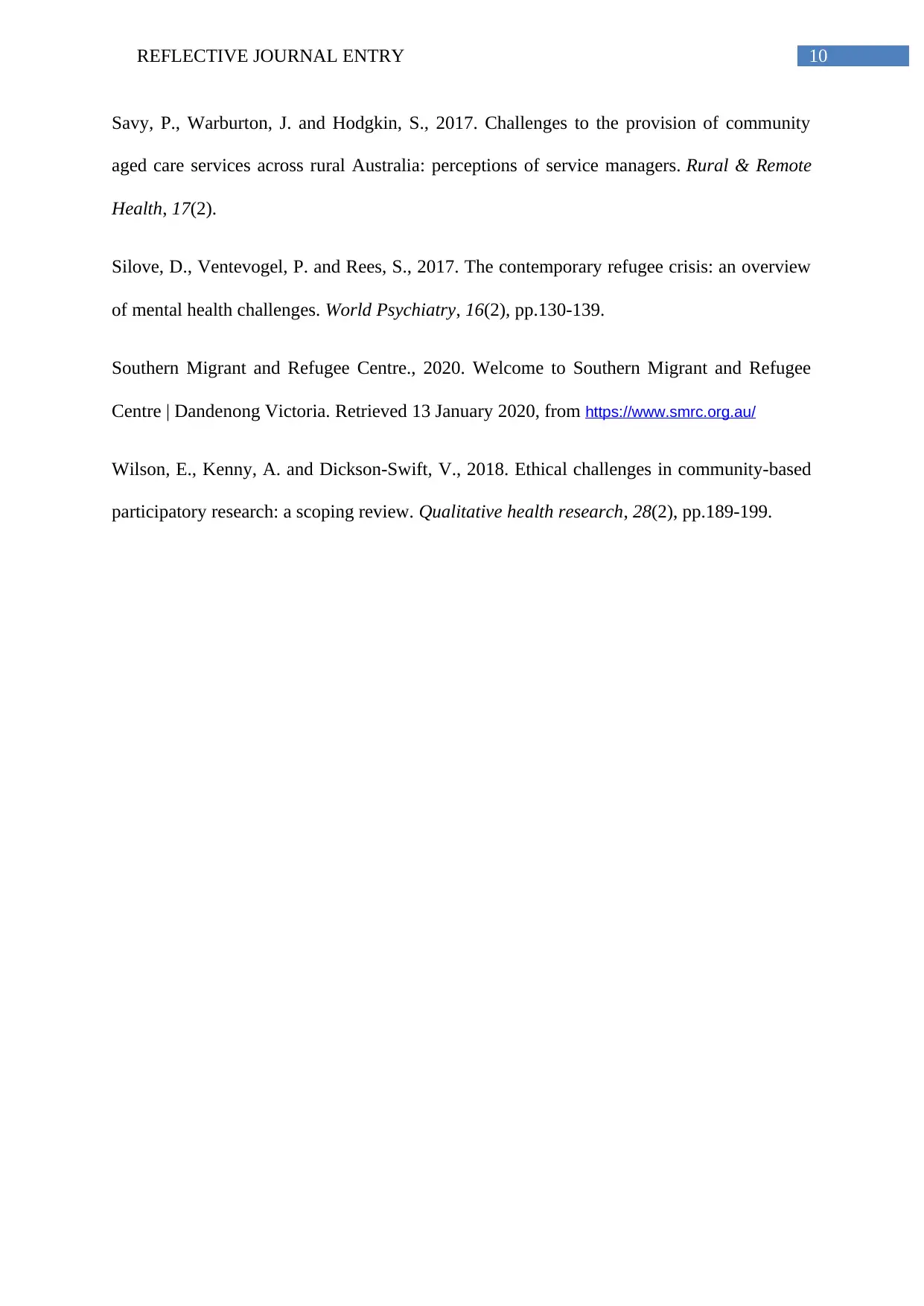
10REFLECTIVE JOURNAL ENTRY
Savy, P., Warburton, J. and Hodgkin, S., 2017. Challenges to the provision of community
aged care services across rural Australia: perceptions of service managers. Rural & Remote
Health, 17(2).
Silove, D., Ventevogel, P. and Rees, S., 2017. The contemporary refugee crisis: an overview
of mental health challenges. World Psychiatry, 16(2), pp.130-139.
Southern Migrant and Refugee Centre., 2020. Welcome to Southern Migrant and Refugee
Centre | Dandenong Victoria. Retrieved 13 January 2020, from https://www.smrc.org.au/
Wilson, E., Kenny, A. and Dickson-Swift, V., 2018. Ethical challenges in community-based
participatory research: a scoping review. Qualitative health research, 28(2), pp.189-199.
Savy, P., Warburton, J. and Hodgkin, S., 2017. Challenges to the provision of community
aged care services across rural Australia: perceptions of service managers. Rural & Remote
Health, 17(2).
Silove, D., Ventevogel, P. and Rees, S., 2017. The contemporary refugee crisis: an overview
of mental health challenges. World Psychiatry, 16(2), pp.130-139.
Southern Migrant and Refugee Centre., 2020. Welcome to Southern Migrant and Refugee
Centre | Dandenong Victoria. Retrieved 13 January 2020, from https://www.smrc.org.au/
Wilson, E., Kenny, A. and Dickson-Swift, V., 2018. Ethical challenges in community-based
participatory research: a scoping review. Qualitative health research, 28(2), pp.189-199.
1 out of 11
Related Documents
Your All-in-One AI-Powered Toolkit for Academic Success.
+13062052269
info@desklib.com
Available 24*7 on WhatsApp / Email
![[object Object]](/_next/static/media/star-bottom.7253800d.svg)
Unlock your academic potential
Copyright © 2020–2025 A2Z Services. All Rights Reserved. Developed and managed by ZUCOL.



